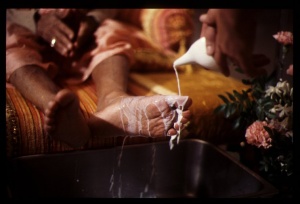SB 4.9.58-59: Difference between revisions
(Vanibot #0018 edit: make synonym terms in Sanskrit italic in SB - Vanisource) |
(Vanibot #0054 edit - transform synonyms into clickable links, which search similar occurrences) |
||
| Line 28: | Line 28: | ||
<div class="synonyms"> | <div class="synonyms"> | ||
''dhruvāya'' | ''[//vanipedia.org/wiki/Special:VaniSearch?s=dhruvāya&tab=syno_o&ds=1 dhruvāya]'' — on Dhruva; ''[//vanipedia.org/wiki/Special:VaniSearch?s=pathi&tab=syno_o&ds=1 pathi]'' — on the road; ''[//vanipedia.org/wiki/Special:VaniSearch?s=dṛṣṭāya&tab=syno_o&ds=1 dṛṣṭāya]'' — seen; ''[//vanipedia.org/wiki/Special:VaniSearch?s=tatra&tab=syno_o&ds=1 tatra] [//vanipedia.org/wiki/Special:VaniSearch?s=tatra&tab=syno_o&ds=1 tatra]'' — here and there; ''[//vanipedia.org/wiki/Special:VaniSearch?s=pura&tab=syno_o&ds=1 pura]-[//vanipedia.org/wiki/Special:VaniSearch?s=striyaḥ&tab=syno_o&ds=1 striyaḥ]'' — household ladies; ''[//vanipedia.org/wiki/Special:VaniSearch?s=siddhārtha&tab=syno_o&ds=1 siddhārtha]'' — white mustard seed; ''[//vanipedia.org/wiki/Special:VaniSearch?s=akṣata&tab=syno_o&ds=1 akṣata]'' — barley; ''[//vanipedia.org/wiki/Special:VaniSearch?s=dadhi&tab=syno_o&ds=1 dadhi]'' — curd; ''[//vanipedia.org/wiki/Special:VaniSearch?s=ambu&tab=syno_o&ds=1 ambu]'' — water; ''[//vanipedia.org/wiki/Special:VaniSearch?s=dūrvā&tab=syno_o&ds=1 dūrvā]'' — newly grown grass; ''[//vanipedia.org/wiki/Special:VaniSearch?s=puṣpa&tab=syno_o&ds=1 puṣpa]'' — flowers; ''[//vanipedia.org/wiki/Special:VaniSearch?s=phalāni&tab=syno_o&ds=1 phalāni]'' — fruits; ''[//vanipedia.org/wiki/Special:VaniSearch?s=ca&tab=syno_o&ds=1 ca]'' — also; ''[//vanipedia.org/wiki/Special:VaniSearch?s=upajahruḥ&tab=syno_o&ds=1 upajahruḥ]'' — they showered; ''[//vanipedia.org/wiki/Special:VaniSearch?s=prayuñjānāḥ&tab=syno_o&ds=1 prayuñjānāḥ]'' — uttering; ''[//vanipedia.org/wiki/Special:VaniSearch?s=vātsalyāt&tab=syno_o&ds=1 vātsalyāt]'' — out of affection; ''[//vanipedia.org/wiki/Special:VaniSearch?s=āśiṣaḥ&tab=syno_o&ds=1 āśiṣaḥ]'' — blessings; ''[//vanipedia.org/wiki/Special:VaniSearch?s=satīḥ&tab=syno_o&ds=1 satīḥ]'' — gentle ladies; ''[//vanipedia.org/wiki/Special:VaniSearch?s=śṛṇvan&tab=syno_o&ds=1 śṛṇvan]'' — hearing; ''[//vanipedia.org/wiki/Special:VaniSearch?s=tat&tab=syno_o&ds=1 tat]'' — their; ''[//vanipedia.org/wiki/Special:VaniSearch?s=valgu&tab=syno_o&ds=1 valgu]'' — very pleasing; ''[//vanipedia.org/wiki/Special:VaniSearch?s=gītāni&tab=syno_o&ds=1 gītāni]'' — songs; ''[//vanipedia.org/wiki/Special:VaniSearch?s=prāviśat&tab=syno_o&ds=1 prāviśat]'' — he entered; ''[//vanipedia.org/wiki/Special:VaniSearch?s=bhavanam&tab=syno_o&ds=1 bhavanam]'' — the palace; ''[//vanipedia.org/wiki/Special:VaniSearch?s=pituḥ&tab=syno_o&ds=1 pituḥ]'' — of his father. | ||
</div> | </div> | ||
Latest revision as of 22:01, 18 February 2024

A.C. Bhaktivedanta Swami Prabhupada
TEXTS 58-59
- dhruvāya pathi dṛṣṭāya
- tatra tatra pura-striyaḥ
- siddhārthākṣata-dadhy-ambu-
- dūrvā-puṣpa-phalāni ca
- upajahruḥ prayuñjānā
- vātsalyād āśiṣaḥ satīḥ
- śṛṇvaṁs tad-valgu-gītāni
- prāviśad bhavanaṁ pituḥ
SYNONYMS
dhruvāya — on Dhruva; pathi — on the road; dṛṣṭāya — seen; tatra tatra — here and there; pura-striyaḥ — household ladies; siddhārtha — white mustard seed; akṣata — barley; dadhi — curd; ambu — water; dūrvā — newly grown grass; puṣpa — flowers; phalāni — fruits; ca — also; upajahruḥ — they showered; prayuñjānāḥ — uttering; vātsalyāt — out of affection; āśiṣaḥ — blessings; satīḥ — gentle ladies; śṛṇvan — hearing; tat — their; valgu — very pleasing; gītāni — songs; prāviśat — he entered; bhavanam — the palace; pituḥ — of his father.
TRANSLATION
Thus as Dhruva Mahārāja passed on the road, from every place in the neighborhood all the gentle household ladies assembled to see him, and out of maternal affection they offered their blessings, showering him with white mustard seed, barley, curd, water, newly grown grass, fruits and flowers. In this way Dhruva Mahārāja, while hearing the pleasing songs sung by the ladies, entered the palace of his father.